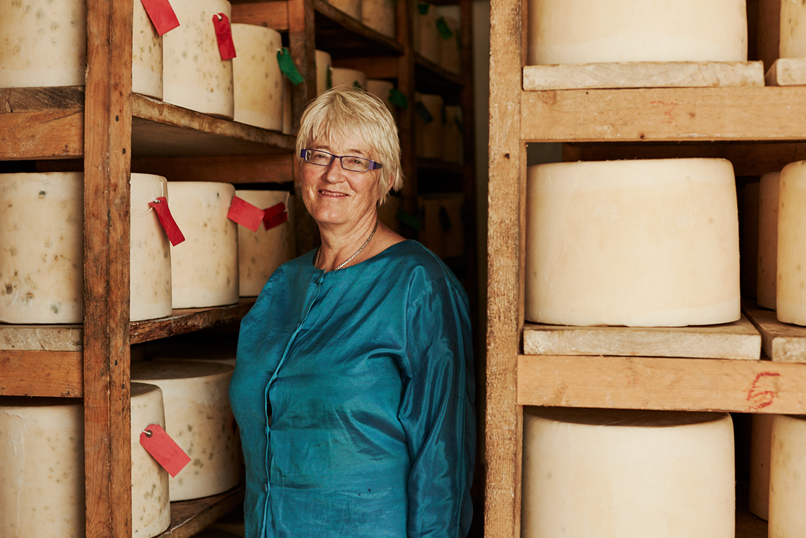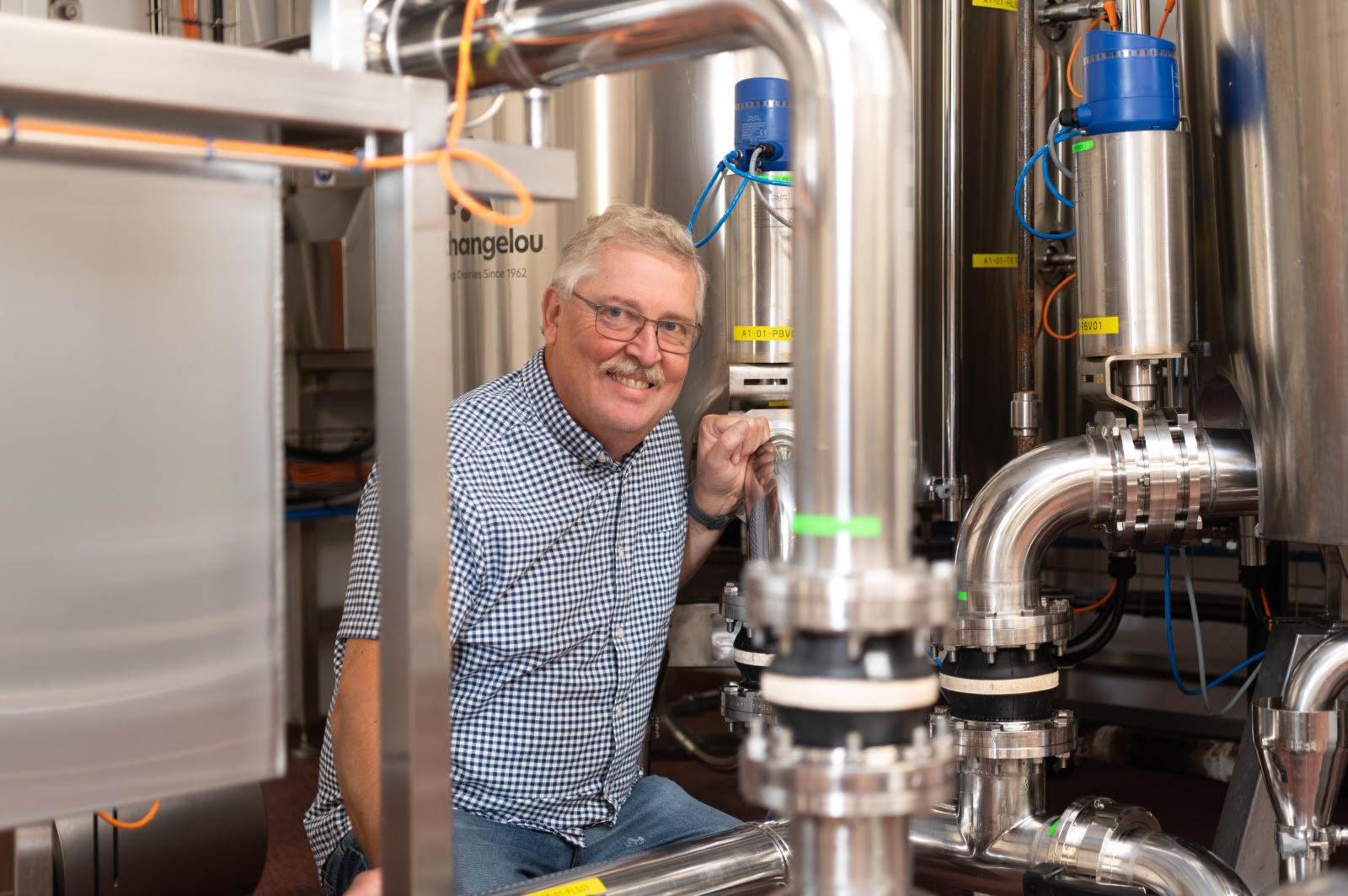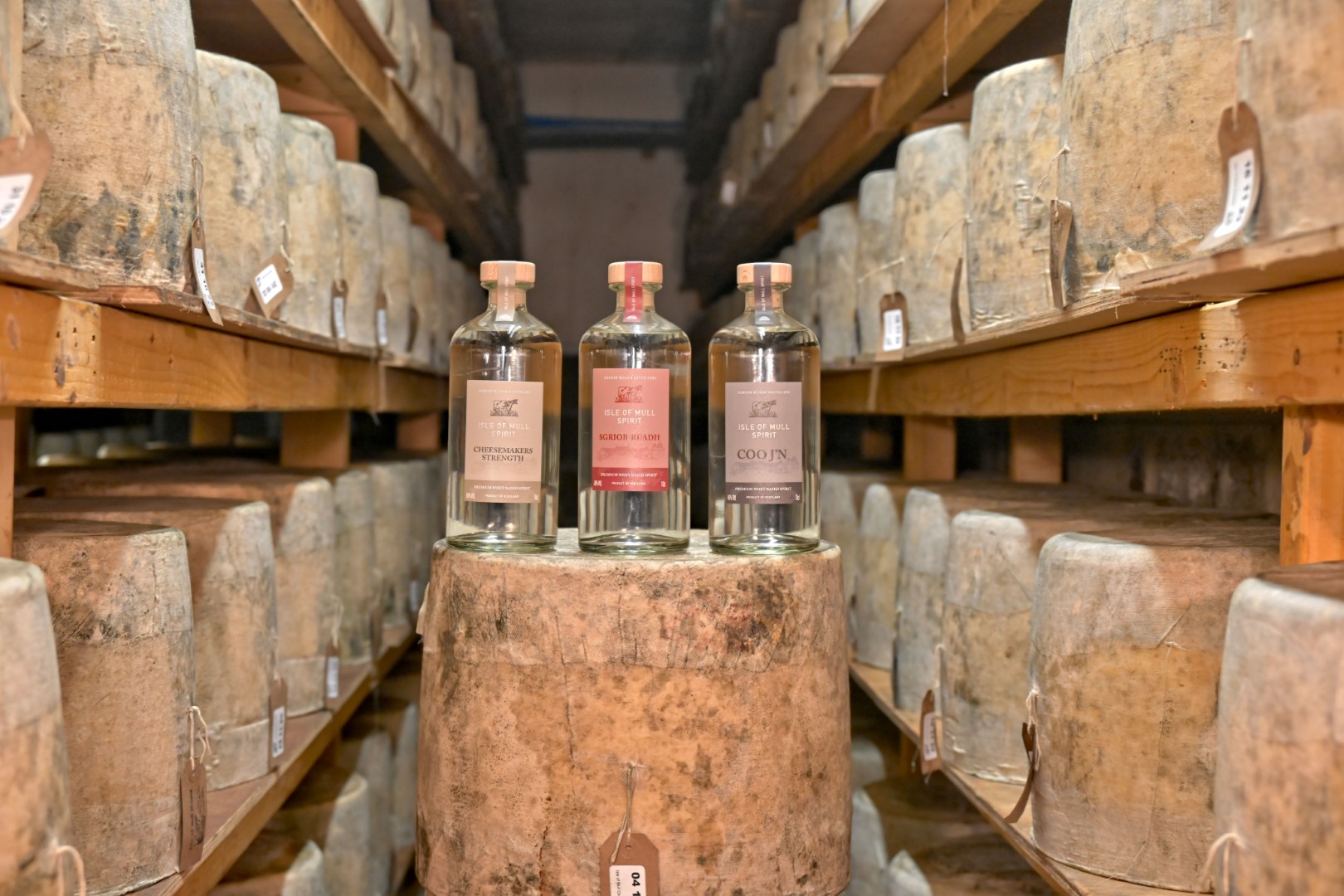Free digital copy
Get Speciality Food magazine delivered to your inbox FREE
Get your free copy
One of the UK’s leading artisan cheese importers and distributors, Anthony Rowcliffe, has added family-run Hawkridge Farmhouse Dairy Produce to its portfolio.
Hawkridge offers an extensive, high-quality product range, and has relationships with many delis, farm shops, specialist retail outlets, and the catering industry in the South West of England, and the business will continue to be managed by brothers Simon and Daniel Baker.
Rowcliffe managing director, Sunit Mehta, says, “Rowcliffe has always strived to offer our customers quality products that support the commercial needs of our increasing customer base. This acquisition enables Rowcliffe to continue developing our independent business and, working with both Simon and Daniel Baker, to continue offering our customers premium products and exceptional service. We welcome the Hawkridge family business to Rowcliffe and the Lactalis Group.”

Devon-based cheesemaker, Quicke’s has landed the People’s Choice Award at the first ever Great British & Irish Cheddar Challenge, with its Extra Mature Clothbound Cheddar receiving the most votes during a live public poll. Streamed from Bra, Italy, during the 14th edition of Slow Food’s Cheese festival, the Cheddar Challenge saw cheese lovers, cheesemakers, cheesemongers and commentators come together for an epic celebration of artisan Cheddar.
Hosted by founder, James Grant of No2 Pound Street in Buckinghamshire, and comedian and curd nerd, Marcus Brigstocke, the Cheddar Challenge saw thousands of people tuning in for a live tutored tasting, having purchased special tasting boxes of six artisan cheddars from cheesemongers across the UK. Taking viewers on a journey through soil health, pastures, cows, milk, cheesemaking, maturation and much more, the challenge then invited participants to vote for the nation’s favourite cheddar.
Following a live online vote, Quicke’s Extra Mature Clothbound Cheddar, made by Mary Quicke in Newton St Cyres, Devon, topped the list.
Mary Quicke MBE, says, “I’m so excited to win the Great British & Irish Cheddar Challenge, amongst so many wonderful Cheddars. I’m so proud of our cows that make the lovely milk and our team that produce and mature the cheese that so many people voted for. Thank you!”
Following devastating flooding in December 2022, owing to a series of pipes bursting in freezing weather, Blackwoods Cheese Company has announced it is back in production again. The damage, says the company, was severe, with the entire dairy having to be gutted and rebuilt, halting all cheese production at what is usually the business’s busiest time of year.
Blackwoods first Graceburn cheeses of 2023 went back into production at the end of August, with the team now running at full steam to meet demand. The original, Chipotle & Lemon, and Truffle-flavoured cheeses will be back in stock soon, with wholesale availability from this month.

Appleby Creamery, in Cumbria’s Eden Valley, is celebrating a £150,000 investment in renewable energy to futureproof the business. “This is all part of our ongoing commitment to sustainability at the creamery,” says managing director, Maurice Walton, of the project, which included the installation of 480 solar panels.
“Electricity usage is very high here, and we want to be as green as possible in our operation.” The project has been part-funded by a grant from The Lake District Foundation and Westmorland and Furness Council, through the ‘Greening Eden’ initiative.
Maurice continues, “During the day the panels are supplying all our power and, once we install a suitable battery storage system in early 2024, which will be partly funded by Cumbria LEP, we hope to become almost self-sufficient in electricity and reduce consumption of LPG (Liquified Petroleum Gas).”
One of Britain’s oldest cheeses, with a heritage dating back to 1670, has returned to its homeland. Sage Derby (the only flavour-added classified territorial cheese in Britain) started life in Throwley Moor, Derbyshire, but has more recently been produced in Warwickshire.
Adrian Fowler (the 14th generation of the Fowler cheesemaking family) says he is delighted to report the cheese is back in its rightful place, adding that he’s handed the baton over to Hartington Creamery near Newhaven, which has taken over production.
“It’s only a few miles away from where the original Fowlers started making cheese,” Adrian says. “You couldn’t get closer if you tried.”
Adrian says the cheese is “A nice piece of heritage. It has a great flavour profile. It’s got a truly earthy taste that takes you back to the roots of traditional cheesemaking. The original idea behind putting sage into the cheese was to keep it from blowing, because it was considered a medicinal herb. It also brings a nice balance to the cheese.”

The makers of one of Scotland’s most recognised cheeses have launched a a trio of new spirits, made using whey from the cheesemaking process.
Isle of Mull cheese’s Isle of Mull Spirits sit alongside their Mull Cheese and Hebridean Blue. They include a smooth and strong Cheesemakers Strength, botanical blend, Coo J’n, distilled with many foraged ingredients from their own garden, and Sgriob-ruadh – a sweet and smooth drink with vanilla notes and a hint of chocolate.
Isle of Mull founder Christine Reade, says, “We have made Isle of Mull cheese for many years. Over that time, we have used the whey in various ways, including feeding the calves, and even the cows. It has always been hard to manage, and feeding a few pigs has been the simplest. We have never wanted to keep pigs on a large scale, so the remainder has been spread on the fields.
“We began to worry, when Findlay [Christine’s grandson] came home from agricultural college and enthusiastically dug a hole in the field to look at the soil structure. He reported that there were almost no worms to be found and the drainage was very poor. After some discussion an old idea that my father had thought about came to the fore - fermenting the whey in a controlled environment with the correct yeast would produce a little alcohol that we could distil.”
The family’s on-site distillery is powered by the same wood chip boiler used to make their cheeses, with the cooling water warming up the milk each morning.
“The whole system is symbiotic and sustainable,” adds Christine.
One of Scotland’s few PGI status cheeses will be ready for retail this festive season thanks to retailer I J Mellis Cheesemongers.
Traditional, historic Ayrshire Dunlop (given its status in 2006) is only produced by Ann Dorward, and I J Mellis remains the only stockist, having taken delivery of a number of three-month-old truckles in June.
The cheeses have been brushed, turned and tasted over the course of late summer, and are now available to order, in time for Christmas.
Dunlop can trace its history back to 1690, when it was first made by Barbara Gilmour, using milk from her Ayshire cows, known for its high butterfat content.
“The cows fed on the lush pastures of the area – perfect for producing a creamy, Cheddar-like cheese with a distinctly nutty, tangy flavour. As a hard, clothbound cheese, it was easily transported to markets across the country, where it grew in popularity. To add to its lore, there are records of Robert Burns having a brief stint in Dunlop-making when his poetry career wasn’t lucrative.”
Charles Martell & Son (which celebrated its 50th anniversary in 2022) has just launched a 200g Stinking Bishop cheese to fill a niche in the ‘grab and go’ market, in time for the Christmas rush.
The cheese, made on the farm near Hereford, complements the existing range, including a 1.8kg cutting version, and the recognisable 500g variety.
Its name comes from its distinctive odour, conjured during the ripening process, which involves immersing the cheeses in perry made from the local Stinking Bishop pear every four weeks as it matures.
Charles began his career with 10 acres, hand milking three Gloucester cows, without a penny to his name. He says they didn’t get around to celebrating their landmark five decades in business, but are proud to mark the occasion with their latest incantation of Stinking Bishop. It joins the dairy’s other products, from Double and Single Gloucester, to Hereford Hop, May Hill Green, and Slack-ma-Girdle.
Laverstoke Park Farm in Hampshire has added to its range of buffalo milk products (including mozzarella, gouda and Buffalomi) with the release of Buffeta.
“We love to challenge ourselves to make cheeses that are not traditionally made in the UK. But, what’s more – we want to make them better than their originals,” said managing director, Michal Kolinek. “We are passionate about our buffalo milk and all its nutritiojnal benefits. Our latest success is this ‘feta’ style cheese made with a blend of cow’s and buffalo milk.”
The farm’s cheesemakers spent six months refining the recipe, testing it against similar products on the market. Michal said, “We are confident this cheese is going to be a great addition to our range. It tastes fantastic and has the signature creaminess from our buffalo milk.”
Laverstock’s herd of Asian Water buffalo graze freely on organic land, eating a range of grasses, clovers and more than 30 herbs which they believe add to the quality and nutrition of the milk.
Edward Hancock of Cheese Geek is celebrating having brought four exclusive new cheeses to market this year, with some availability to smaller fine food retailers and cheesemongers.
It is part of a plan, the cheese aficionado says, to build up a collection of around 15 to 20 unique varieties, covering every part of the market. “Being online we have a lot of data on ratings, and feedback,” Edward says. “We gather that information, which gives us an idea of what styles of cheese the market is after in terms of artisan cheese.”
The range includes blue, brie-style, washed-rind and a new take on a classic from the Southwest.
Hendrix is described as a melt-in-the-mouth blue, with a saltiness and herbaceousness that takes eaters to its terroir in Wales. It has been designed as a step up from some of the ‘safer’ blue cheeses developed in recent years. “We generally see a lot of new blue cheese coming to market aimed at more cautious cheese lovers,” says Edward. “We wanted to make a cheese that was accessible, unique in its own right, and not dominated by blue veining.”
Eastwood, is the store’s take on a Brie de Meaux. “Baron Bigod has reigned in their area for quite a while, in terms of being the absolute flagship brie-style cheese made in the UK. We wanted to develop a cheese that was slightly lighter in profile, still very complex and rich, but not quite as mushroomy and earthy. Eastwood, I would describe, as more refined than rustic.” The cheese is also, Edward explains, produced in 2kg format, rather than 1kg, taking it closer to a 3kg classic French brie, with more interesting opportunities at the ripening stage.
Cheese Geek’s third cheese, Washington, is based on an existing cheese being made by Carwyn Adams at Caws Cenarth. Washed in cider, and scaled up from 250g to 1kg, the cheese (based on a Golden Cenarth) is ripened for longer. “And at its best it’s incredible, and very very different to other British washed rinds. It pushes boundaries, with a slightly chalky centre, while the edges start to get a bit meatier, along the lines of a Munster. It’s the one I’ll be submitting to the World Cheese Awards.”
Fourth and final (for now) is Swift, made by taking Bath Soft’s Wyfe of Bath beyond its typical maturation of three to six months, and into nine-month territory, where Edward says it almost takes on the complexity of an 18 to 20-month-old Comte. “It straddles young and old. With a supple texture and milky, sweet nuttiness, but with a deeper, savoury flavour coming through.”
A lot have fun has been had on each of the projects. “We’re really pleased with what we’ve ended up with, and looking forward to seeing how the cheeses evolve.”
A dairy in North Norfolk has been marked by Arla as having the lowest carbon footprint (amongst its 900 or so members) in the UK.
Catherine Temple produces a variety of cheeses at Copy’s Green Farm in Wighton, near Wells, including Binham Blue, and Walsingham – each one named for one of the nearby villages where the family farms.
Sustainability is at the core of everything the farm does, and Catherine says it is a real coup to hear that the measures they’re taking to reduce their impact on the environment, are making a difference.
A key part of the farm’s green strategy is growing the cows’ food on site, using regenerative methods which help mitigate climate change by sequestering carbon.
“We grow lucerne,” says Catherine. “We were trying to reduce our use of applied fertiliser, and lucerne is a great crop because it has really deep roots to reach down into the soil when there’s a water shortage, and it fixes nitrogen, so we don’t need to apply any. Also, we only have to plant it once every five years. That means you’re reducing the energy you’d have wasted preparing the land, like you would with annual crops like wheat and barley.”
This project is only the beginning of the farm’s eco endeavours. Rather than importing soy beans for protein, field beans are being grown in a companion planting with the lucerne and oats as animal feed. The plants physically supporting one another, while supplying vital soil nutrition, and flowers that attract pollinating insects.
An anaerobic digester burns manure and organic farm waste, providing all the electricity not just for the self-sufficient farm (and many of its electric vehicles), but for 400 neighbouring houses.
The Brown Swiss cows grazed at Copy’s Green have been specifically chosen for their hardiness, and increased yields (up to 10% more than many other dairy cow breeds), owing to the higher volume of protein in the milk.
And plastic is constantly being checked and reduced as far as possible. “We’ve always used minimal packaging for our cheeses, but with animal feed we’ve gone back to using bales and clamps, and we have cattle food delivered in lorry loads rather than individual bags,” Catherine says.
In a personal challenge, Catherine has also started working with the Norfolk Pond Project and Norfolk Rivers Trust to reinstate farmland ponds and protect local chalk streams. “A load of us filled in ponds from the 50s to the 70s because the government told us to,” she says. “But they are so beneficial in terms of the insects they bring to farms. I’ve been out on my bike surveying places where ponds might have been in the past, and persuading other farmers to do this too. And we’re keeping cows out of the river so they don’t stir up the mud. Water management has become a big issue and it’s just one of many things we’re happy to do, in order to do our bit.”
Catherine says she welcomes other farmers to visit her in North Norfolk to learn more about sustainability in dairy farming and cheese making.